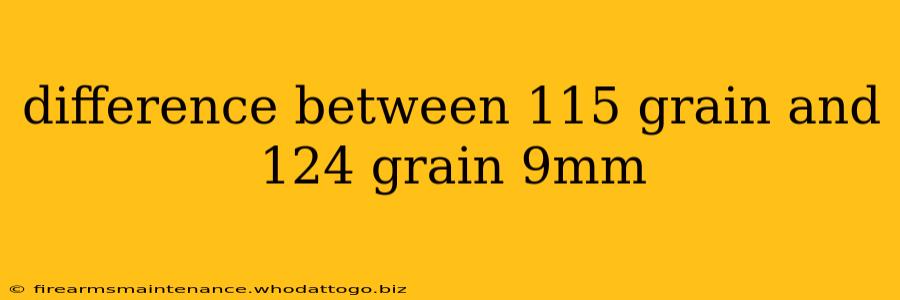Choosing the right ammunition is crucial for any 9mm pistol owner, whether you're a seasoned shooter or just starting out. Two common grain weights frequently debated are 115 grain and 124 grain. Understanding the differences between these rounds can significantly impact your accuracy, felt recoil, and overall shooting experience. This detailed comparison will help you make an informed decision.
Grain Weight: The Foundation of the Difference
The "grain" refers to the weight of the bullet, measured in grains (7,000 grains equal one pound). A 124-grain bullet simply weighs more than a 115-grain bullet. This seemingly small difference has significant downstream effects on several key performance characteristics.
1. Recoil: A Noticeable Shift
Felt recoil is generally greater with 115-grain ammunition. The lighter bullet accelerates faster upon firing, resulting in a sharper, quicker recoil impulse. This can be more noticeable for new shooters or those with smaller hand sizes. Conversely, 124-grain ammo produces a softer, more manageable recoil. The heavier bullet decelerates more slowly, leading to a gentler push that's easier to control, especially during rapid fire.
2. Velocity: Speed Matters
115-grain rounds typically exhibit higher muzzle velocity compared to their 124-grain counterparts. This is directly related to their lighter weight; the same amount of propellant pushes a lighter bullet faster. Higher velocity can translate to flatter trajectory at longer ranges, potentially increasing accuracy. However, 124-grain rounds often compensate for the lower velocity with increased momentum, maintaining stopping power even at longer ranges.
3. Accuracy: A Subtle Nuance
The accuracy difference between 115-grain and 124-grain ammo is often debated and largely depends on individual firearms and shooter preferences. Some shooters find 115-grain ammo more accurate due to its higher velocity and flatter trajectory, particularly at longer distances. Others prefer the manageable recoil and heavier momentum of 124-grain ammo, leading to improved accuracy in rapid-fire scenarios. Ultimately, the best way to determine which grain weight is more accurate for your specific firearm is through thorough testing.
4. Stopping Power: A Complex Issue
The "stopping power" debate is complex and extends beyond simple grain weight. Factors like bullet design (e.g., hollow point, full metal jacket), bullet expansion, and placement of the shot all play critical roles. While a heavier 124-grain bullet generally transfers more energy to the target due to its greater momentum, the impact of bullet design on stopping power is far more significant than the 9-grain difference between these two weights.
5. Cost: A Variable Factor
Pricing can vary between manufacturers and retailers; however, you might find slight differences in the cost per round. Often, the cost difference is negligible and shouldn't be the sole deciding factor.
Which Grain Weight Should You Choose?
The "best" grain weight depends entirely on your individual needs and preferences:
-
For new shooters or those prioritizing manageable recoil: 124-grain ammunition is generally recommended. The softer recoil makes it easier to learn proper shooting techniques and maintain accuracy during practice.
-
For experienced shooters prioritizing high velocity and flatter trajectories (especially for competition or longer-range shooting): 115-grain ammunition might be preferable.
-
For self-defense: The grain weight is less critical than the bullet design. Choose a reputable brand of self-defense ammunition with a hollow-point bullet designed for expansion and reliable stopping power. Test your chosen round for reliable function in your specific firearm.
Ultimately, the only way to definitively determine the best grain weight for your firearm and shooting style is through extensive range time with both 115-grain and 124-grain ammunition. Experiment and discover what works best for you.

